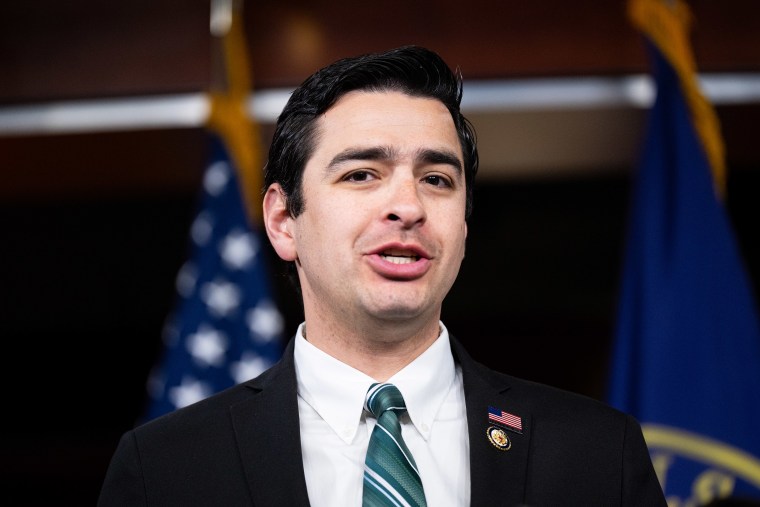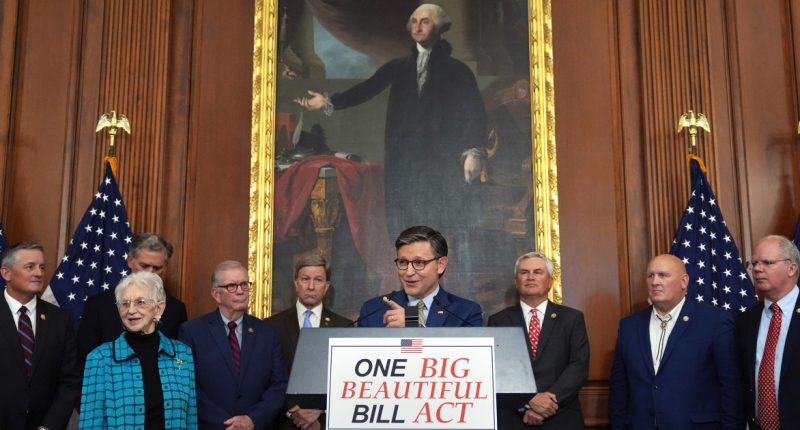Share this @internewscast.com
House Republicans have just passed a comprehensive new bill designed to push forward President Donald Trump’s agenda. This legislation is poised to be a pivotal factor in the battle for control of the House in the upcoming election.
With a net gain of merely three seats, Democrats could regain control of the chamber. This follows the GOP securing the smallest House majority in nearly a century during the last election. For months now, Democrats have been cautioning Republicans about future attacks regarding the bill, criticizing the GOP for alleged reductions to Medicaid and health care for millions in favor of wealthier individuals over those in need. The Democrats have already begun broadcasting ads to solidify this message early.
Conversely, Republicans are banking on the bill, which Trump has referred to as the “one big beautiful bill,” being crucial in demonstrating to voters why they deserve two additional years of unified governance in Washington. The GOP aims to avoid the midterm backlash commonly experienced by a president’s party by energizing Trump’s base through the implementation of his agenda, and by providing key lawmakers in swing states with notable accomplishments to highlight during their campaigns.
“The American people gave us a mandate in November. They sent a message with their vote. They gave this side of the aisle the power, and we’re going to use it to make their lives better,” House Speaker Mike Johnson, R-La., said right before the bill passed.
House Minority Leader Hakeem Jeffries, D-N.Y., sounded a different note Thursday morning: “When the votes are ultimately cast on that first Tuesday in November next year, this day may very well turn out to be the day that House Republicans lost control of the United States House of Representatives.”
Republicans passed the bill Thursday morning by a narrow margin. Only two Republicans, safe-seat Reps. Thomas Massie of Kentucky and Warren Davidson of Ohio, joined every Democrat in voting against the bill.
Reps. Andrew Garbarino of New York and David Schweikert of Arizona did not vote. Every other Republican voted for the bill.
Johnson told reporters Garbarino “fell asleep” and missed the roll call, while Schweikert, who represents one of the nation’s most closely divided swing districts, supported the bill but narrowly missed the vote, too.
The bill now heads to the Senate, where it only needs a majority of senators (Republicans hold a more comfortable 53-47 majority there) before it heads to Trump to be signed into law.
Republicans have touted the bill’s tax cuts as a winning issue. The legislation codifies the cuts the GOP enacted in the first year of Trump’s first term, which were due to expire later this year, while expanding the state and local tax deduction cap — a major win for blue-state Republicans, many of whom are facing tough races in high-tax districts.
The bill also includes measures eliminating taxes on tips and overtime work and orders new spending on the military and for immigration enforcement, while making cuts to Medicaid, domestic food aid and clean energy tax credits. The nonpartisan Congressional Budget Office says the bill would cut health care coverage for 8.6 million people.

House Majority Forward, the nonprofit aligned with Democrats’ main super PAC focused on House races, put out “messaging guidance” this week on the GOP bill, a signal to the constellation of similar-minded outside groups about what top party strategists believe is the best way to attack Republicans over the legislation.
“An economic contrast argument focused on the Republican agenda prioritizing tax cuts for the wealthy at the expense of basic services that working families rely on is a key to success,” the guidance reads. It continues: “The most effective messages on the budget legislation focus on tying the budget to an overall story of Trump making life less affordable in order to help the wealthy.”
House Majority Forward has spent six figures on ads in seven competitive House districts so far, like one in Colorado that criticizes Republican Rep. Gabe Evans for backing the budget plan.
“Gabe Evans was sent to Washington to cut costs. Instead, Evans just cast the deciding vote to set up cuts threatening health care,” the ad says, going on to accuse the GOP of “cutting Medicaid and making health care more expensive so millionaires can pay less.”
American Action Network, a nonprofit aligned with the House GOP’s campaign arm, has been running ads across the battleground, too, like one in Evans’ Colorado district blasting the “misinformation out there trying to scare seniors.”
“Trust me, Congressman Gabe Evans is fighting to protect all of us. He’s supporting President Trump’s commonsense reforms to root out waste, fraud and abuse, fixing the Biden pill penalty, while preserving our benefits,” an older man says in the ad.

Viet Shelton, a spokesperson with the Democratic Congressional Campaign Committee, pointed to the frustration at congressional town halls earlier this year and told NBC News in a statement that he expects the bill to lead to more pressure on Republicans, calling it “one big broken promise to the American people.”
“It raises costs, kicks millions off of their health insurance, and rigs the tax code to benefit the ultra-wealthy and big corporations,” he said. “Republicans have already been hiding in fear from the public all year, and the backlash is only going to get louder because of this toxic vote.”
Democrats have pointed to the CBO’s estimate that the legislation would increase the national debt by $2.3 trillion over 10 years and cause household resources for the bottom decile of earners to decrease by 4%, while increasing among the top decile by 2% by 2033.
But Republican groups have been signaling they won’t let those attacks go unanswered. They believe the broad tax cuts, the elimination of taxes on tips and overtime work, and the new funding for national defense and immigration enforcement are proof they’ve kept their promise to voters who delivered them unified control of Washington last November.
As lawmakers head home for a recess over the Memorial Day holiday, one national GOP operative told NBC News they would already be seeking to hammer vulnerable Democrats for not voting for the bill’s tax cuts.
“We will be using that messaging very consistently going forward,” the operative said. “I’m sure you’ll see a lot of ads and all different types of messaging memos that go out for every single one of these Democrat targets to talk about how they voted against cutting taxes.”
The bill also expands the child tax credit, which Republicans believe could be a political winner, and the compromise that expanded the state and local tax deduction cap was a key victory particularly for Republicans facing tough races in high-tax states like California, New York and New Jersey. Five of the 18 House Republican districts rated as “toss-up” or “lean Republican” races by the Cook Political Report with Amy Walter are in those states.
Plus, vulnerable Republicans have pushed back on the criticism of the Medicaid provisions, arguing the cuts target waste, fraud and abuse in the program.
The national GOP operative accused Democrats of “fearmongering” with their messaging about threats to Medicaid.
“Democrats have been using this message for probably, like, 10 years at this point,” the operative said, later adding that the Republican Party’s description of its actions does well in surveys: “The polling shows that our agenda, where we’re strengthening Medicaid and cutting waste, fraud and abuse, and implementing work requirements, you know, cutting 1.5 million illegals off of Medicaid — all of those things are very favorable.”
The two parties have switched roles since the last midterm, when President Joe Biden and his party enacted two laws passed through budget reconciliation, the technical procedure that allows a bill to pass with a simple majority vote in the Senate, instead of needing to clear a 60-vote filibuster threshold.
That means the party in power fully owns the results, the good and the bad.
Democrats pointed to the 2021 Covid stimulus bill (the American Rescue Plan Act of 2021) as a centerpiece of their messaging in the midterms and last year’s elections, arguing it provided needed funding that boosted the nation’s pandemic recovery and helped ward off a recession. And they made a similar political argument about the 2022 reconciliation bill, the Inflation Reduction Act, which, like the new GOP bill, was jammed with a host of the party’s different policy priorities.
The legislation opened up lines of attack on Democrats, too, including some that proved significant as the GOP narrowly captured the House majority in 2022.
Republicans took aim at the spending, arguing the Inflation Reduction Act was inflaming inflation and serving as a Trojan horse for liberal policies. That was a key plank in their argument against the Democrats’ handling of the economy in 2024, too.











